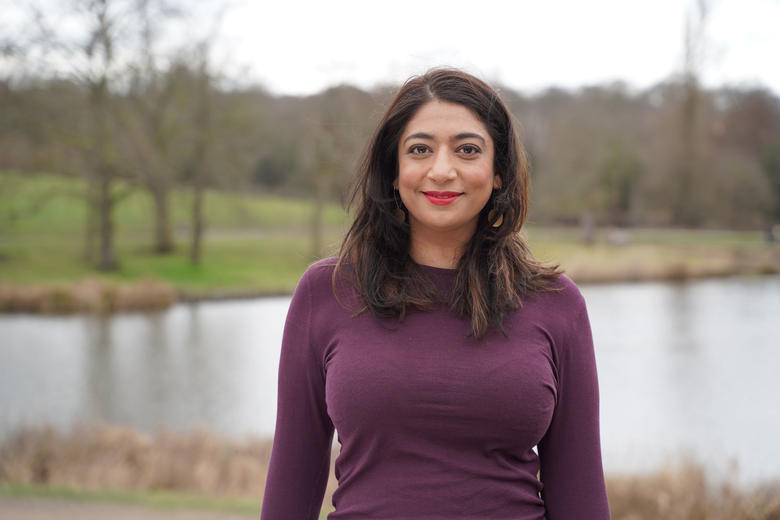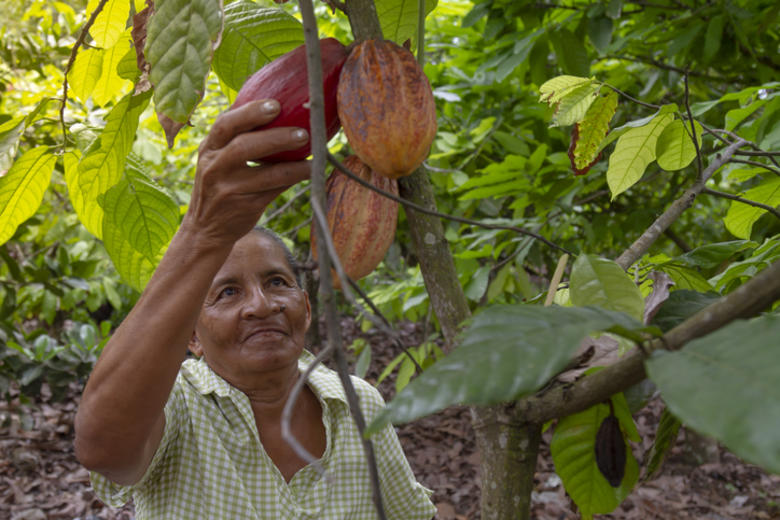ALUMNI STORIES: 'I HOPE THE MENOPAUSE WILL BECOME AN ACCEPTABLE TOPIC OF CONVERSATION'
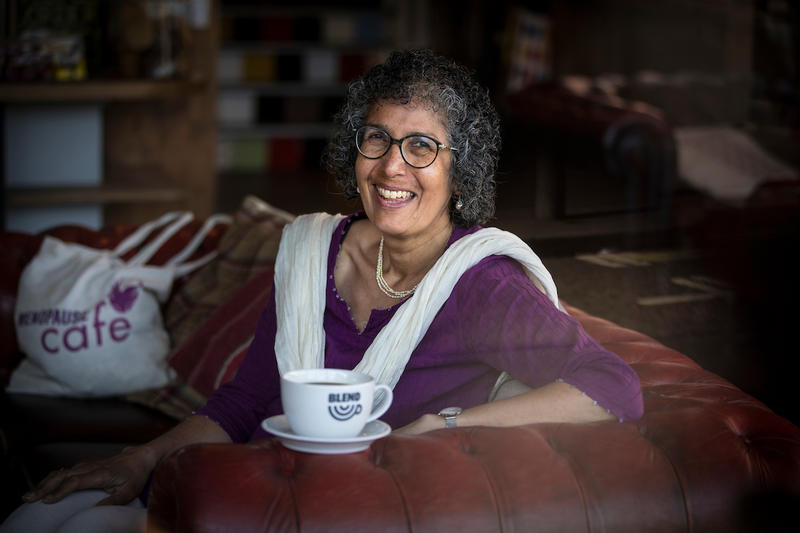
ALUMNI STORIES: 'I HOPE MENOPAUSE WILL BECOME AN ACCEPTABLE TOPIC OF CONVERSATION'
Rachel Weiss (Hertford, 1985) talks about what inspired her to set up the Menopause Cafe charity
Published: 23 August 2023
Author: Joanna Whiting
Share this article
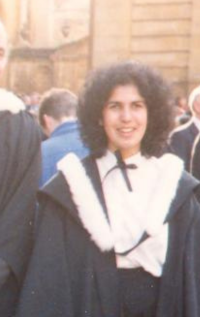
How have your professional and personal experiences led you to where you are today?
It hasn’t been a straight path!
I graduated in maths in the 80s, when the banks were queuing up to recruit us at milk rounds. I knew I didn’t want to work for a bank, but I didn’t know what I did want to do. So I took a year out working with Lebanese refugees in Berlin, living in a Christian community and improving my German. From this, I discovered that I like working with people. What do you do with a maths degree if you like working with people? Teach!
Teaching was demanding and rewarding. I did a Counselling Diploma, to become a better teacher, then, due to personal circumstances (husband stopping working to wait for a liver transplant plus three children to support) I ended up starting a counselling practice in Perth, Scotland. This gave me the flexibility to make hospital visits, that teaching couldn’t. 26 years later Rowan Consultancy is flourishing; Andy is alive and reasonably well, thanks to an organ donor and their family; our children have left home; and I’ve started the Menopause Café charity. My voluntary work there builds on the many, varied experiences I’ve had since graduating, which gave me: business skills, people skills and the courage to speak up.
Where did the inspiration for Menopause Café come from?
In February 2017 I watched a BBC documentary, Menopause and Me, by Kirsty Wark, and realised how complicated menopause can be and that people don’t talk about it.
From my counselling work, I knew how helpful being listened to in a non-judgmental way can be. From hosting Death Cafes I knew a great format for creating space for such conversations.
These three strands gave me the idea to host the world’s first Menopause Café in Perth in June 2017. People gathered to drink tea, eat cake and talk menopause.
What has been the most rewarding part of running Menopause Cafe?
The impact that our events have on people’s lives. The most common feedback comments are “Now I know I’m not alone” or “Now I know I’m not going mad”, and “Now I’m going to book an appointment with my GP instead of ignoring my menopause symptoms”.
Also, I love being centre stage, so I enjoy hosting #FlushFest23 and being interviewed by the media. Not something that happens in my day job as a counsellor!
How did the concept grow from the first café into a charitable organisation?
Jon Underwood let us use the Death Cafe social franchise model , which allows volunteers worldwide to sign up to our principles and host their own cafes, worldwide, in person or online. They don’t need to know anything about menopause, but they do need facilitation skills. So we soon had several hosts and events nationwide.
We hosted a workplace café for our local electricity company. They wanted to give us some money, but could only give money to registered charities, so I filled in the paperwork and we became a Scottish Charitable Incorporated Organisation (SCIO). When I was at Oxford, helping to co-ordinate the Night Shelter volunteers, we were told we could access funding if we become a University Society, so we did! My experience of founding a society helped give me the confidence that I could turn Menopause Café into a charity.
You’re about to host your fifth annual Menopause Festival – FlushFest – can you tell us more about that?
#FlushFest is the world’s first menopause festival, celebrating this stage of life and exploring it through expert talks, workshops and creative arts: song, poetry, sculpture, comedy, sewing. #FlushFest started in Perth in 2018. #FlushFest23 will be a hybrid event in Edinburgh and online, 8-9 September 2023.
Last year we had Nicola Sturgeon, First Minister of Scotland, in conversation with our patron, Kirsty Wark (you can watch their conversation on our YouTube channel). This year we will welcome Val McDermid in conversation with her wife, Prof Jo Sharp, on living with a menopausal partner. Menopause is not all doom and gloom!
What are your hopes for future, both for the charity and for education around menopause in general?
I hope our charity will eventually become redundant, since menopause will become an acceptable topic of conversation, free from shame and ignorance. But that will mean eradicating gendered ageism, which may take a while! In the meantime, I hope Menopause Café charity will become more sustainable, by acquiring experienced Trustees who can guide us to financial stability, employing people instead of being entirely run by volunteers.
For menopause education in general: thanks to Diane Danzebrink’s #MakeMenopauseMatter campaign, menopause is now on the school curriculum for England & Wales. I’d like everyone to know the basics about menopause, to be prepared themselves and to support their family friends and colleagues. We also need more menopause education for medics and more research on the menopause.
Many employees feel forced to reduce their hours at work, pass up promotions and even quit their jobs due to lack of menopause support. What would be your suggestions and tips for employers wanting to adapt to support menopausal workers?
- Act now to attract, support and retain talented, experienced menopausal employees.
- Read the CIPD Menopause at Work guide and the BSI Menstruation, menstrual health and menopause in the workplace guide
- Consider signing the Menopause Workplace Pledge or the EMAS Menopause and Work Charter or become a Menopause Friendly Accredited Employer
- Foster a culture where people can discuss reasonable adjustments which may be needed.
- Train your managers in menopause symptoms and how to mitigate them.
- Mention menopause and menstruation in your policies.
- Host Menopause Cafes!
What words of encouragement would you give to anyone thinking of attending or hosting a Menopause Café?
- It’s normal to feel nervous going to your first café. Feel free to bring a friend, our cafes are open to all ages and genders. If you come alone, you won’t be the only one and your host will make you welcome.
- If there isn’t a café near you, consider one of our online cafes.
- You will be amongst friends!
For hosts:
- Read our Guide and sign our Working Agreement to use our trademarked name and logo.
What top three pieces of advice or information would you offer to people going through the menopause
- Take your symptoms seriously, seek help: lifestyle changes like being more active, eating more healthily, cultivating sleep and relaxation, medication.
- Talk about it.
- See this as a time of transition into becoming an elder or wise woman – it’s different, not better or worse, just different.
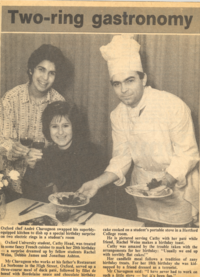
What are your favourite memories of your time at Oxford?
Favourite memories include shopping in the covered market for spontaneous picnics in University Parks, the freedom of cycling, experiencing desire and being desired, fellowship in the Christian Union and Catholic Chaplaincy and studying in beautiful buildings: Duke Humfrey’s library was my favourite rather than the soul-less old Maths Institute.
A particular fond memory is asking the chef from La Sorbonne to cook a gourmet 21st birthday meal for my friend Cathy on my forbidden two-ring stove!
How do you think that Oxford changed you?
I met people who were more weird/eccentric/clever than me, so I could stop trying to fit in and be myself. I felt I belonged. Due to paired or individual tutorials, I learned to ask for what I needed, to follow my own interests instead of holding back, like at school. I learned how to start a society, the Homeless Action Group(HAG), for students volunteering in the Night Shelter.
Find out if there is a Menopause Cafe near where you live.
#Flushfest23 is live in Edinburgh and online from 8-9 September 2023.




